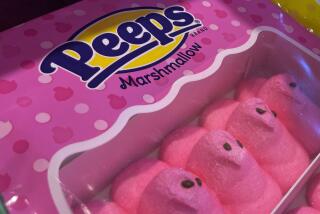Smoke and Snuff Make Prop. 65’s Toxic List
- Share via
DAVIS, Calif. — Tobacco smoke, along with snuff and other smokeless tobacco products, was among 47 substances added Friday to the list of cancer-causing chemicals that will be regulated under the state’s tough new toxics control law.
The action was taken by a scientific advisory panel appointed by Gov. George Deukmejian to prepare a list of 200-plus chemicals that will be covered by the Safe Drinking Water and Toxic Enforcement Act, which was approved by voters as Proposition 65 in 1986.
The panel listed tobacco smoke as both a carcinogen, because is known to cause cancer, and a reproductive toxicant, because it is known to have an adverse effect on the fertility of males and females.
The panel did not deal specifically with the issue of secondary smoke, but secondary smoke is likely to be included in future actions under Proposition 65.
Spokesmen for manufacturers of smokeless tobacco products argued unsuccessfully to the scientific panel that their products should not be regulated with other tobacco products because they are not burned or inhaled.
“Smokeless tobacco has not been established as a cause of any human disease, including cancer,” said Michael J. Kerrigan, president of the Washington-based Smokeless Tobacco Council.
UC Davis Hearing
He was one of dozens of lobbyists and government affairs advocates representing chemical companies, industrial firms and tobacco interests who crowded into a theater at UC Davis for the daylong hearing.
The panel rejected Kerrigan’s arguments and voted unanimously to add smokeless tobacco to its list of chemicals because the tobacco contains the same carcinogenic substances found in cigars, cigarettes and pipe tobacco.
When the panel completes its work, the list will be given to Deukmejian. The governor will be free to add or delete chemicals from the list, but he is expected to go along with all of the panel’s recommendations.
Once the list is published, the Department of Health Services will assess the health risk posed to the public by the various substances and devise appropriate warnings.
Tobacco products, including snuff, currently carry health warnings, but the state could impose even stricter warnings. For example, restaurants, bars and other public places might be required to post warnings that cigarette smoke may pose a health hazard.
Most of the chemicals added to the list Friday are little-known substances used as ingredients to make plastics or manufacture industrial cleaning solvents.
Two of the chemicals, testosterone and a type of estrogen known as mestranol, are male and female hormones and are contained in oral contraceptives and fertility drugs.
The panel plans to meet again in April. Once it is decided that a product carry a warning, companies will have to comply or face a fine of up to $2,500 a day for each chemical exposure.
More to Read
Sign up for Essential California
The most important California stories and recommendations in your inbox every morning.
You may occasionally receive promotional content from the Los Angeles Times.












